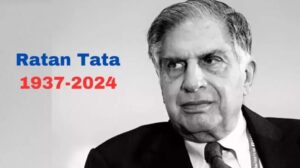Mumbai, October 9, 2024 (TBB Bureau): Ratan Naval Tata, the Chairman Emeritus of Tata Sons and one of India’s most revered business leaders, passed away on Wednesday at the age of 86 at Breach Candy Hospital, Mumbai, following age-related health complications. His death marks the end of an era in Indian industry and leaves a profound void in the corporate, philanthropic, and national landscape.
 Tata had been admitted to the hospital earlier this week, sparking widespread concern and speculation about his health. While initially dismissing rumors, stating he was undergoing routine examinations, reports soon emerged that he had been placed on life-support systems, though officials from Tata Group did not confirm these details.
Tata had been admitted to the hospital earlier this week, sparking widespread concern and speculation about his health. While initially dismissing rumors, stating he was undergoing routine examinations, reports soon emerged that he had been placed on life-support systems, though officials from Tata Group did not confirm these details.
N Chandrasekaran, Chairman of Tata Sons, expressed the deep sense of loss shared by all those touched by Tata’s leadership, saying, “It is with a profound sense of loss that we bid farewell to Mr. Ratan Naval Tata, a truly uncommon leader whose immeasurable contributions have shaped not only the Tata Group but also the very fabric of our nation.”
Chandrasekaran continued, “For the Tata Group, Mr. Tata was more than a chairperson. To me, he was a mentor, guide, and friend. He inspired by example. With an unwavering commitment to excellence, integrity, and innovation, the Tata Group under his stewardship expanded its global footprint while always remaining true to its moral compass.
“Mr. Tata’s dedication to philanthropy and the development of society has touched the lives of millions. From education to healthcare, his initiatives have left a deep-rooted mark that will benefit generations to come. Reinforcing all of this work was Tata’s genuine humility in every individual interaction. On behalf of the entire Tata family, I extend our deepest condolences to his loved ones. His legacy will continue to inspire us as we strive to uphold the principles he so passionately championed.”
Ratan Tata’s tenure as Chairman of Tata Sons, from 1991 until his retirement in 2012, was transformative. Under his leadership, the Tata Group expanded its global presence and multiplied its revenues, surpassing $100 billion by 2011-12. Known for his gentle demeanor paired with sharp business acumen, Tata guided the group through its most significant phase of international acquisitions, including iconic deals like the acquisition of Jaguar Land Rover and Corus Steel.
During his illustrious career, Tata chaired many of the group’s flagship companies, including Tata Motors, Tata Steel, Tata Consultancy Services, Tata Power, and Tata Chemicals. His leadership extended beyond the Tata Group, with positions on international advisory boards for Mitsubishi Corporation and JP Morgan Chase, among others.
Educated in Mumbai, Tata pursued a Bachelor of Architecture at Cornell University and worked briefly in Los Angeles before joining Tata Group in 1962. His ascent within the organization saw him rise to the Chairmanship of Tata Industries in 1981, where he played a pivotal role in positioning the conglomerate as a strategic and technological leader.
Ratan Tata’s influence was not limited to business. His philanthropic work, guided by the Tata Trusts, transformed the group’s charitable efforts into India’s most respected foundations. His work in areas like healthcare, education, and rural development directly impacted millions of lives. Chandrasekaran noted Tata’s relentless commitment to improving society, describing his philanthropic legacy as one that will endure for generations.
Tata’s contributions earned him numerous accolades, including the Padma Vibhushan, India’s second-highest civilian award, in 2008. His name became synonymous with trust, integrity, and visionary leadership, both in India and on the global stage.
Tata is survived by his extended family, including his brothers and sisters: Simone Tata, Jimmy Tata, Noel Tata, Aloo Tata, Shireen Jejeebhoy, Deanne Jejeebhoy, Leah Tata, Maya Tata, Neville Tata, Manasi Tata, Jamset Tata, and Tiana Tata, among others, as per a statement released by the family.
As the nation mourns the loss of this icon, Ratan Tata’s legacy will undoubtedly continue to inspire generations, with his contributions serving as a guiding light for the future of Indian industry and philanthropy.
 The Business Bytes
The Business Bytes